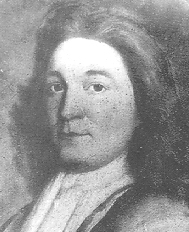William Phips was born on February 2, 1651 near Kennebec, Maine, the youngest of 26 children. His father was a gunsmith. Though Phips never attended school, he learned the ship-carpentry trade and, at an early age, set off on foot for Boston. Soon after arriving in Boston, Phips met ship captain Roger Spencer. The relationship with Spencer led Phips later to a job as captain of carried goods between New England and the West Indies. In 1687, an investor-backed expedition led by Phips recovered the treasure from sixteen Spanish ships that were lost at sea near the Bahamas in the early 1600's. He kept sixteen percent of his discovery, the majority of the treasure went to the investors, and the king received the remaining ten percent. As a result of his efforts, the king knighted Phips and appointed him the first Governor of Massachusetts.
On May 14, 1692 Phips arrived in Boston. He brought with him a charter ending the 1684 English law banning colonies from self government. Under this new charter, the legislature was to set up a judicial system until October. However, on May 27, deciding matters too serious to wait until October, Phips issued a commission for a Court of Oyer and Terminer (criminal jurisdiction) to hear witch trial evidence. Phips appointed William Stoughton as chief justice, though Stoughton had no legal education, and John Alden, John Hathorne, Nathaniel Saltonstall, Bartholomew Gedney, Peter Sergeant, Samuel Sewall and Wait Still Winthrop as judges.
As accusations of witchcraft spiraled, even Phips' own wife, Lady Mary Phips, was named as a witch. Soon thereafter, in October of 1692, Phips ordered spectral evidence and testimony would no longer suffice to convict suspects in future trials. Three weeks later Phips prohibited further arrests of witches, released 49 of the 52 of the accused witches still in prison and dismissed the Court of Oyer and Terminer. In May of 1693, Phips pardoned the remaining suspected witches still in prison.
Phips died on February 18, 1695.

